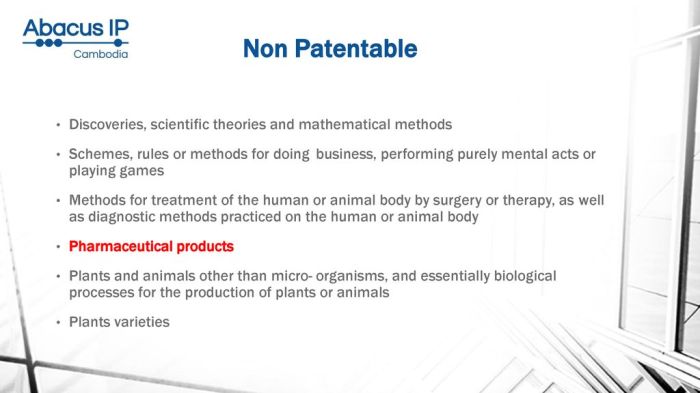Certain business processes are patentable. – Certain business processes are patentable, opening up a realm of opportunities for businesses to protect their intellectual property and gain a competitive edge. This article delves into the legal framework, advantages, and considerations associated with patenting business processes, providing valuable insights for entrepreneurs and innovators seeking to safeguard their unique methodologies.
The patentability of business processes hinges on meeting specific criteria, including novelty, non-obviousness, and usefulness. By obtaining a patent, businesses can establish exclusive rights over their innovative processes, preventing competitors from exploiting their ideas without authorization.
1. Legal Framework

The legal basis for granting patents for business processes stems from the recognition that innovative and novel processes can drive economic growth and progress.
In the United States, business processes are considered patentable subject matter under 35 U.S. Code § 101, which defines a “process” as “any new and useful process, machine, manufacture, or composition of matter, or any new and useful improvement thereof.”
Criteria for Determining Patentability
- Novelty: The process must be new and not previously known or used.
- Non-obviousness: The process must not be obvious to someone with ordinary skill in the art.
- Utility: The process must have a practical application and provide a tangible benefit.
Examples of Patented Business Processes
- Amazon’s “One-Click” purchasing process
- Google’s “AdWords” advertising platform
- Uber’s ride-hailing platform
2. Advantages of Patenting Business Processes

Patenting a business process offers numerous advantages, including:
Intellectual Property Protection
- Prevents competitors from using or copying the process without authorization.
- Strengthens the company’s intellectual property portfolio.
Competitive Advantage
- Provides a unique selling proposition and differentiates the business from competitors.
- Can be leveraged to negotiate favorable licensing agreements.
Financial Rewards
- Generates revenue through licensing fees or royalties.
- Increases the company’s valuation and attractiveness to investors.
3. Considerations for Patenting Business Processes
Before patenting a business process, it is crucial to consider several factors:
Factors to Consider
- Cost of obtaining and maintaining a patent.
- Potential for competitors to design around the patent.
- Risk of patent infringement lawsuits.
Process for Filing a Patent Application
- Prepare a detailed patent application.
- Submit the application to the relevant patent office.
- Respond to any requests for clarification or amendments.
Risks and Challenges
- Patents can be challenged and invalidated.
- Patents may not provide complete protection against infringement.
- Patents can be expensive to enforce.
4. Case Studies and Examples

Several successful business process patents have been granted, including:
Case Study: Amazon’s “One-Click” Purchasing Process
Amazon’s patent for its “One-Click” purchasing process revolutionized online shopping by allowing customers to complete purchases with a single click.
Case Study: Google’s “AdWords” Advertising Platform, Certain business processes are patentable.
Google’s patent for its “AdWords” advertising platform created a new revenue stream for the company and transformed the online advertising landscape.
Case Study: Uber’s Ride-Hailing Platform
Uber’s patent for its ride-hailing platform enabled the company to disrupt the taxi industry and create a new mode of transportation.
Commonly Asked Questions: Certain Business Processes Are Patentable.
What are the key criteria for determining the patentability of a business process?
Novelty, non-obviousness, and usefulness are the primary criteria used to assess the patentability of business processes.
What are the benefits of obtaining a patent for a business process?
Patenting a business process provides exclusive rights, protects intellectual property, enhances credibility, and potentially generates financial rewards.
What factors should businesses consider when deciding whether to patent a business process?
Factors to consider include the novelty and value of the process, the potential for infringement, and the costs and time involved in obtaining and maintaining a patent.